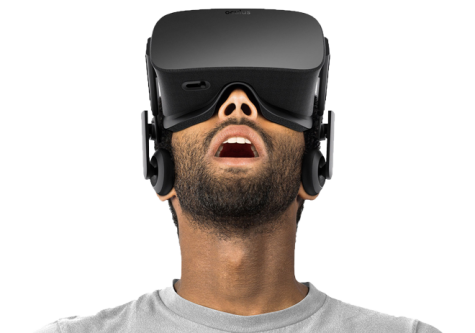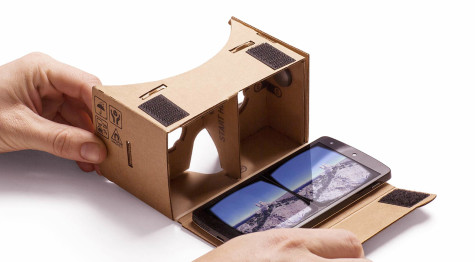Virtual Reality
The next big thing?

Two years ago, when Oculus revealed the first modern VR headset I laughed at my screen. Images of bulky visors strapped to archaic machines instantly rushed to my head. VR, Virtual Reality, had tried to surface once before in the dimly lit underbelly of now-extinct ’90s arcades, and it flopped. Hard.
For 20 years the idea of complete immersion remained nothing but a tainted pipe-dream, the sour taste of VR’s previous failure still fresh in the mouths of the general public. Then in the summer of 2013, Oculus stole the Consumer Electronics Show in Las Vegas. Word spread quickly that someone had made a VR experience that actually felt real, and all over the internet, people became excited again.

Since then, we’ve seen an explosion in the market. Companies such as Samsung, Microsoft and Sony have poured billions into research and development, rushing to put out a product. Google pioneered a cheaper solution with Cardboard, a simple sleeve anyone can make and slide their phone into.
Virtual Reality is finally becoming mainstream. As development catches on, we can expect big changes in gaming, movies, even how we consume web pages and watch TV.
VR is spreading to the most unlikely of places, too. Just last month the LA Philharmonic launched an app for Samsung devices, allowing participants to jump into the middle of the orchestra as it plays Beethoven’s Fifth all around them. YouTube now supports 360-degree videos and anyone with a smartphone can experience some truly stunning footage. Within the next two years we can expect to see even more applications pop up as developers get comfortable with the platform.

Recently, Time announced it would be doing a cover story on Oculus in preparation for the launch of their Rift headset in early 2016. Many saw this as confirmation for the company and the technology itself. Finally VR was making strides in the real world. Yet, when the magazine hit the shelves, people were outraged rather than excited. The CEO of Oculus, the company bought by Facebook for over $1 billion, stood on his tiptoes frolicking along a virtual beach.
Right now, Virtual Reality stands at a unique middle ground. The technology could rise to prominence, or we could see a ’90s-style flop with 20 years before another resurface. Media perception and public acceptance are the two most important factors of this, and starting in January consumers will start to vote with their wallets. So is VR the next big thing? I would say that’s up to you to decide.








